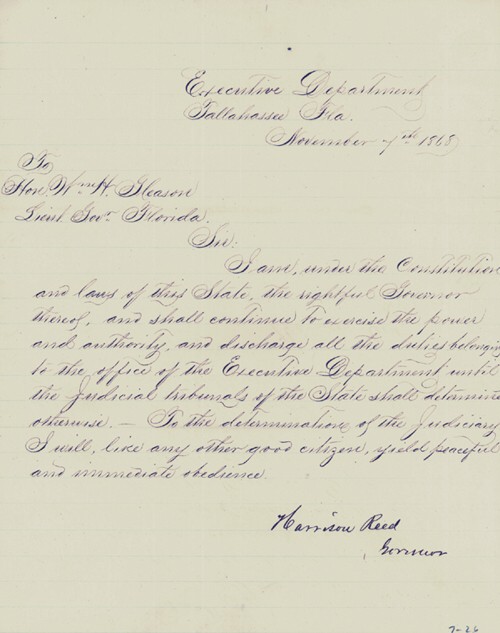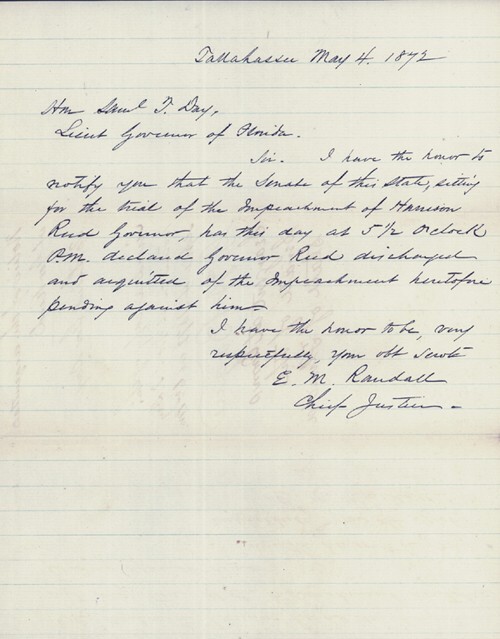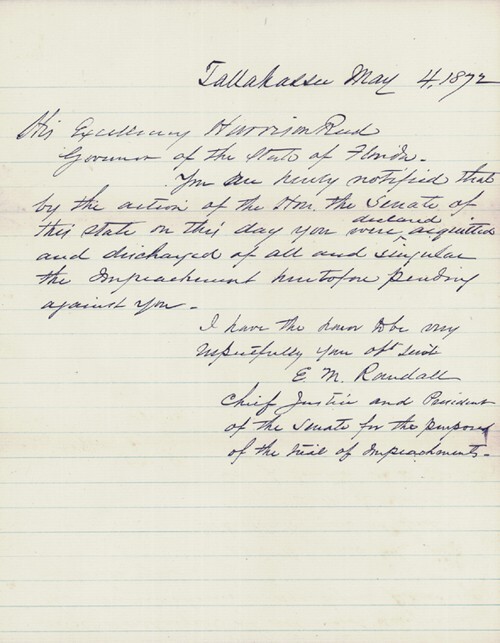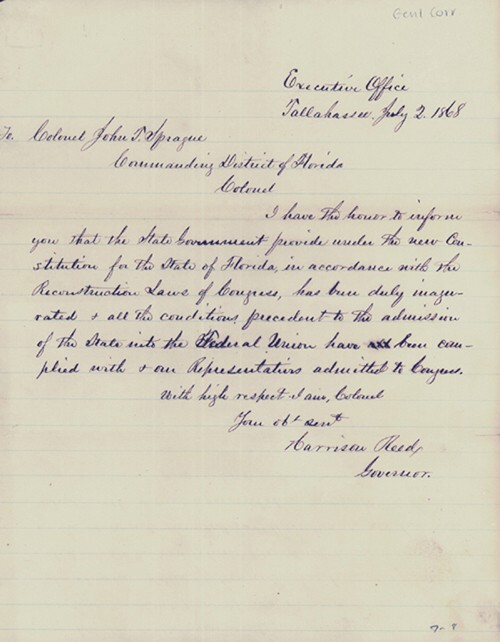| |
 |
Letters Relating to the Efforts to Impeach Governor Harrison ReedDuring the Reconstruction Era |
| |
(From: Governor, State Governors' Incoming Correspondence, 1857-1888, Series 577)Photos and text Courtesy, Florida State Library and Archives.Harrison Reed (1813-1899), a native of Littleton, Massachusetts, served as Florida governor from 1868 until 1873. Reed lived in Wisconsin until 1861, when he came to Washington, D.C. to work in the Treasury Department. He was appointed Direct Tax Commissioner for Florida and moved to Union-occupied Fernandina in 1863. At the close of the war he became a Federal postal agent for Florida. In 1868 he won election to governor, but during his term he faced virulent opposition from Democrats and even from factions within the Republican Party. The latter groups made two attempts to remove him from office. Document 1 relates to the first effort to oust Reed, which occurred in 1868. In the fall of that year, an anti-Reed faction in the state legislature attempted to remove the governor, but the legislature adjourned on November 7 before the Senate could conduct an impeachment trial. Lieutenant Governor William H. Gleason proclaimed himself governor and, though was barred from the capitol by Reed supporters, he established an office and issued documents signed as the state's chief executive. On November 24, the Supreme Court of Florida ruled that Reed had never been officially impeached because a quorum did not exist when the Senate originally charged him. Reed then successfully moved to oust Gleason as lieutenant governor on the grounds that he failed to meet the state's residency requirements. Gleason would subsequently be removed from office the following month. TranscriptionDocument 1Executive Department To Sir: I am, under the Constitution and laws of this State, the rightful Governor thereof, and shall continue to exercise the power and authority, and discharge all of the duties belonging to the office of the executive Department until the Judicial tribunals of the State shall determine otherwise. -- To the determination of the Judiciary I will, like any other good citizen, yield peaceful and immediate obedience. Harrison Reed
Documents 2 and 3 relate to a second effort to remove Governor Harrison Reed in 1872. Reed was impeached by the Florida House of Representatives in February 1872. Considering himself suspended until a trial was concluded, Reed left Tallahassee for his home near Jacksonville. In Reed's absence, Lieutenant Governor Samuel T. Day proclaimed himself acting governor. After the legislature adjourned without bringing Reed to trial, the governor assumed that this was the equivalent of an acquittal. In April 1872, when Day had briefly left Tallahassee, Reed returned and declared himself the chief executive. Once more Reed asked for a decision from the Florida Supreme Court on who was governor. The justices upheld Reed's claim to the office and stated that Day was "in no sense Governor." An attempt by day to hold a special session of the legislature to vote on the impeachment charges ended on May 4, 1872 with a dismissal of the charges against Reed. The controversial governor would complete his term, which ended in early 1873. TranscriptionDocument 2Tallahassee May 4, 1872 Sir- I have the honor to notify you that the Senate of the State, sitting for the trial of the impeachment of Harrison Reed Governor, has this day at 5 1/2 O'clock P.M. declared Governor Reed discharged and acquitted of the Impeachment heretofore pending against him- I have the honor to be, very E.M. Randall Document 3Tallahassee May 4, 1872 You are hereby notified that by the action of the Hon. the Senate of this state on this day you were declared acquitted and discharged of all and singular the Impeachment heretofore pending against you - I have the honor to be very respectfully your obt servt E.M. Randall Chief Justice and president
Readmission of Florida into the Union, 1868As a result of the Military Reconstruction Act, passed on March 2, 1867, congressional Republicans effectively took control of Reconstruction away from President Andrew Johnson. The Act's provisions divided the ex-Confederate States (except Tennessee) into five military districts, required black suffrage and ratification of the Fourteenth Amendment, and called for conventions to establish new constitutions in each of the affected states. Delegates to the Florida Constitutional Convention were elected in November 1867. The bitterly divided convention met in Tallahassee the following January, and after much controversy, a new constitution, with black suffrage, was adopted and approved by the voters in May 1868. Republican Harrison Reed was elected governor, and on July 2 he wrote a letter (Document 4) to the military commander of Florida, Colonel John T. Sprague, informing him that Florida had completed the requirements to be readmitted to the Union. TranscriptionDocument 4Executive Office Tallahassee, July 2, 1868 Colonel John T. Sprague Commanding District of Florida Colonel I have the honor to inform you that the state government provide[d] under the new Con- stitution [sic] for the State of Florida, in accordance with the Reconstruction Laws of congress, has been duly inagu- rated & all the conditions precedent to the admission of the State into the federal Union have been com- plied with & our Representatives admitted to Congress. with high respect I am, Colonel
|
|
All files on this site are copyrighted by their creator. They may not be reproduced on another site without specific permission from Vickie Sturgill Stevens . Although public information is not in and of itself copyrightable, the format in which they are presented, the notes and comments, etc., are. © 2013 FlGenWeb Project |



